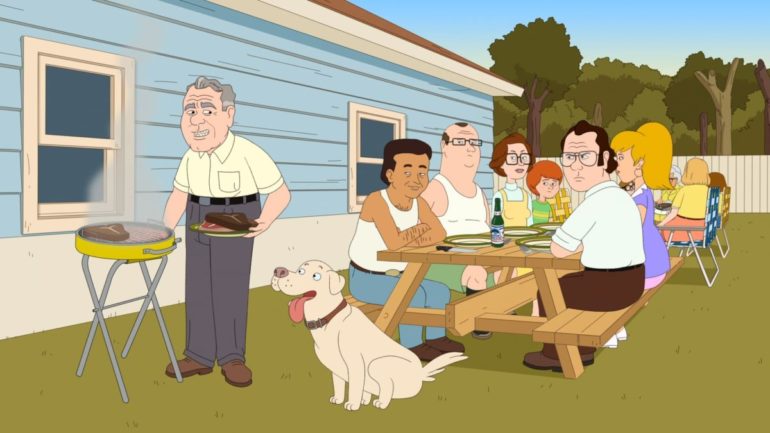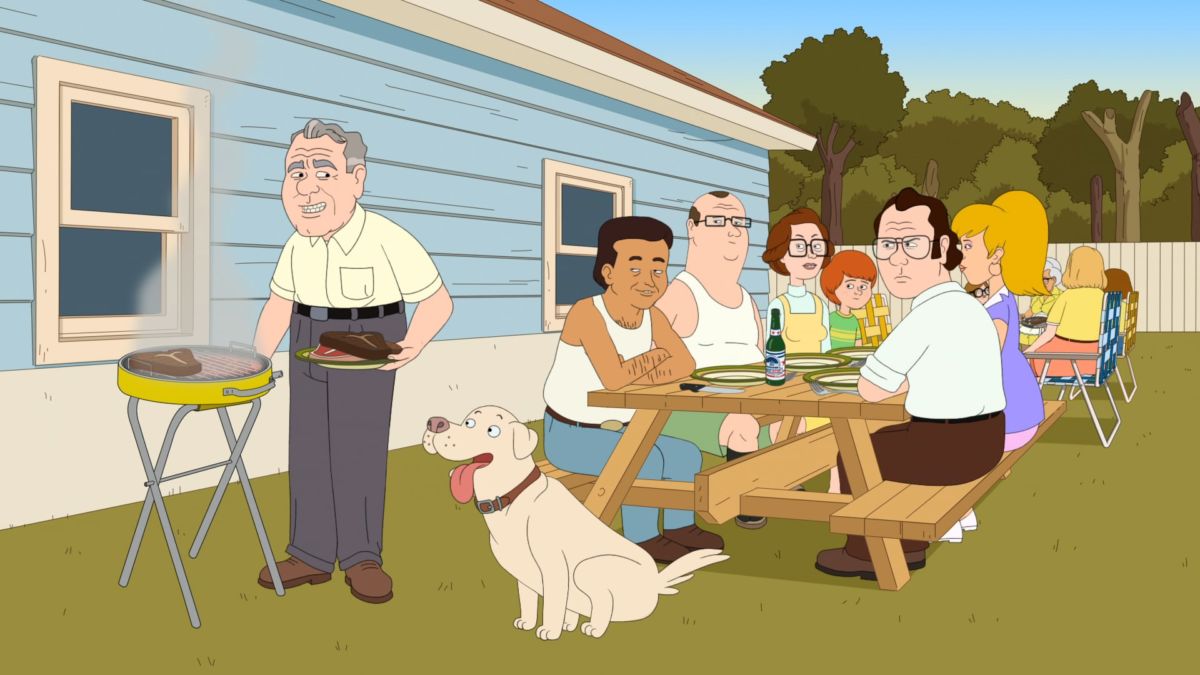Bill Burr’s whack at the family-centric cartoon sitcom, F Is For Family, is back – and it’s still a relatively strong entry in the genre. This is a niche that’s seen a lot of entrists and imitators since The Simpsons first shook the world in 1989, so to make it to the fourth season is quite an achievement. But to make it to the fourth season and actually be good places you in the higher echelons straight off the bat.
One hesitates to use the term ‘workmanlike’, even if it is coming from Burr, a stand-up comedian for whom turning out jokes actually is the daily grind. What I perhaps mean is consistent. The show’s never wound up improving in any particular way on its original run, but neither has it ever stumbled and given us an obvious stinker.
The last season of F Is For Family ended on the cliffhanger of Frank’s awful father turning up to stay – a fairly trite plot development on the face of it, and further, given the kinds of awful fathers presented by stuff like Peep Show and It’s Always Sunny In Philadelphia, as I said at the time they’d need to pull out something pretty bloody special. And against all odds, they have, in the form of Jonathan ‘Mike from Breaking Bad’ Banks.
Banks is already best known for playing gruffly fatherish figures – and, rather than turning up and being generally awful, he manages to infuriate Frank more by turning up and being generally amiable. Compounding this for American viewers (presumably most of the audience anyway) is the fact they’ve drawn him to look a lot like Mr. Rogers, the beloved children’s host and general icon of wholesomeness.
At times the show goes a little too hard on that the idea that Frank has essentially become his own father – even the simplest of viewer can probably get that after the third or fourth anvil-clanging demonstration, so the way it then continues to elude Frank is slightly tiresome. It does evolve beyond that, eventually, but takes longer than you might expect.
This would be a more dramatic flaw if the narrative was leaning on Frank, but it’s not. He is, arguably, the centrepiece – it’s him who’s voiced by Burr, the creator-writer– but F Is For Family has always done a very good job at juggling plotlines for every member of the household, and to a lesser extent some of the more prominent ancillary characters. Rosie, Frank’s work buddy and resident representative of black America, even gets his own spotlight episode.
Inevitably, some characters get more attention than others – Bill, the son, gets little more than a one-note complement to Frank’s father/son issues, which is surprising given that Bill can’t represent anyone quite so much as Burr himself. Somewhat better served are the Murphy women, who had themselves previously been quiet examples of the family’s inescapable generational cycles, where the same unpleasant dynamics get handed down from parent to child.
As family-based cartoon sitcoms go, the grandmaster and OG is The Simpsons, there’s no question there. But Marge, that family’s mother, was the clear weak link – even in a family where the men were bigger, bolder characters, she was deliberately boring to the point where that became the joke, a perennial afterthought, who very often might as well have actually been barefoot and pregnant for all she actually featured in the show. Nobody ever put this better than BoJack Horseman creator Raphael Bob-Waksburg, when he asked the simple but devastating question ‘does Marge have friends?’
Sue Murphy is hovering in the same sort of lonely place, but does actually interact with the other women of F Is For Family – albeit they’re still not really her friends (apart from troubled murderess Nguyen-Nguyen, only present in a shamefully brief cameo). Here, though, it feels deliberate, rather than accidental as it was with Marge, not the result of an all-male writer’s room quietly leaning away from writing a housewife. And we’re actually seeing Sue grumble through a pregnancy, something we never saw from Marge outside of flashbacks.
Meanwhile, Maureen, the daughter, most shunted-aside of all the Murphys’ children – and that’s a tall bar to clear – has reacted in the way you might expect, by making a wholly inappropriate friend. This fruitful dynamic, sad to say, ends up getting shunted aside itself to make way for the bigger plotline of Sue’s pregnancy. This is the unfortunate fate of a couple of secondary storylines, sputtering out before they have a chance to get good: I point again to poor Nguyen-Nguyen, more free in prison than she was ever likely to be on the outside.
Perhaps season 4’s real winner on the roulette wheel of screentime and story attention is Vic, one of the show’s best creations, who’s moved up from the bit-part of enviable next-door-neighbour to practically being the sixth Beatle. Elder son Kevin’s plotline is entwined with Vic’s, making him fun uncle in all but blood. Further, he’s no longer just a wacky aspirational fantasy – here Vic’s party-boy lifestyle is finally showing its downside, as he goes through a mid-life crisis at the ripe old age of thirty.
The real strength of F Is For Family is its ability to not get bogged down by the heavier, emotional moments, but to keep bringing the funny – this was what always let down the generally robust Bob’s Burgers, whose more heartfelt moments were the obvious Achilles’ heel, rote and by-the-numbers to the point you could change the names and slot them into a soap opera. A bad soap opera.
Instead of simply letting these moments tediously grind out, F Is For Family is usually quick to puncture them by having something silly happen. This doesn’t have to mean undermining the actual emotional stakes, and usually doesn’t. Instead it’s simply leavening proceedings by either shocking you or making you laugh out loud – which are often one and the same. The show being a 1970’s period piece really shines in this regard. Should the plot stray into a doldrum, they’ve got a slew of things we simply couldn’t imagine today to pep things up: a horrifying lack of safety here, a little good-humoured racism there.
(Another plus point: it’s very good at depicting racism without ever screwing up and endorsing it, like Family Guy does.)
F Is For Family isn’t mould-breaking, not by a long shot – and it’s no stranger to the kind of obvious vulgarity a name like that suggests. But when it comes to that sort of obvious vulgarity, it’s the way you tell them, and typically it has a composer’s ear for that. There’s nothing that original about it, not least because it’s set in the ‘70s, but with all the components worn smooth with use, they’ve got the format down to a fine and very watchable art.
Some of the coverage you find on Cultured Vultures contains affiliate links, which provide us with small commissions based on purchases made from visiting our site.


